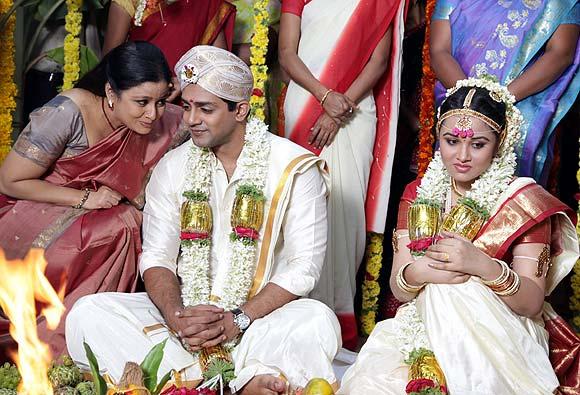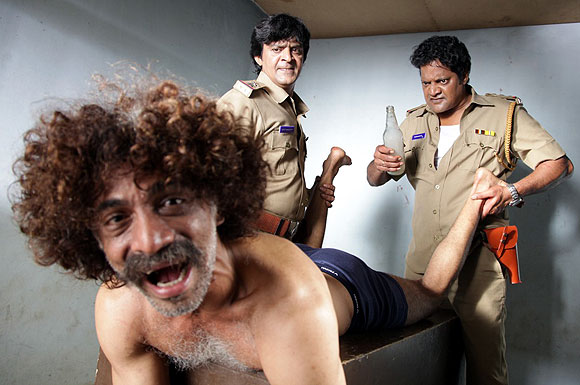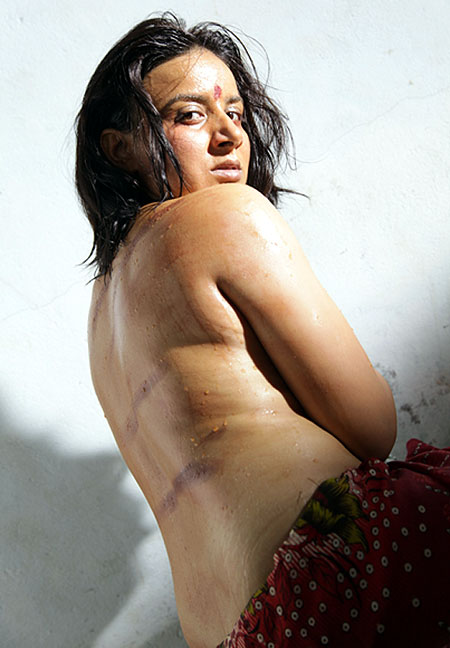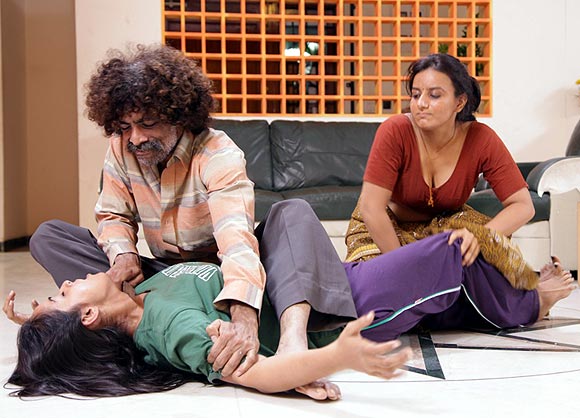 | « Back to article | Print this article |
'Dandupalya gives a new dimension to the crime genre'
Dandupalya, the controversial Kannada film, is releasing this Friday amidst a lot of curiosity.
The film has been given 'A' certification by the censors with almost 13 cuts.
The film is based on the real-life Dadupalya gang that unleashed terror in the late 1990s in the Bangalore and other areas.
The cast includes Pooja Gandhi, Priyanka (Nisha) Kothari, Raghu Mukherjee, Sudha Rani, Doddanna and Ravishankar. Prominent actors Makrand Deshpande and Ravi Kale play members of the gang.
Dandupalya is directed by Srinivasa Raju, who earlier made the Kannada film Kote, which had bloody murders, action, loud and punchy dialogues besides some cleverly crafted acting sequences.
In this interview with Srikanth Srinivasa, Srinivasa Raju talks about the film, the gang that inspired it and the controversy surrounding it.
What is the film Dandupalya all about?
The film is about the gang that unleashed terror. It is a new dimension to crime and the genre is definitely shocking.
Audiences are already aware of the gang's activities but when they see actors performing, they can understand better how the crimes took place.
The crimes are crude and without purpose although the motive of the gang was small money.
'The Dandupalya gang committed heinous crimes'
What was the trigger to make a film on the gang?
The Dandupalya gang committed heinous crimes. I read an interesting newspaper article by chance and that actually prompted me to go deeper into the activities of the gang.
I came across explosive stuff suggesting that they behaved like animals.
What kind of preparation went into making such a film?
I wanted to get the facts first. So I met some senior police officers, including Dy SP N Chalapathi, a sub-inspector then, who eventually ended the gang's five-year run, to know their experiences. I also got my hands on what had appeared in the print and electronic media.
Did you meet the members of the Dandupalya gang?
Yes, I met them in jail. They are serving death sentences. I heard their version of the story. All that they wanted was some small and easy money.
'This film is an effort to document human behaviour'
What was the modus operandi of the gang?
All the 11 members came together to unleash terror. The women were all members of a family. The women used to observe a house for two or three days, and keep tabs on the timings of the household members.
They used a rod wrapped in a cloth to attack the victim, to avoid sound. They used to clean their fingerprints with blood and water. The gang never left witnesses.
Basically, they targeted loners at home -- wives or old people. Their primary targets were middle-class, sometimes upper middle class families. They would not target rich families because the big houses are usually guarded with security and dogs.
The gang used to either engage an autorickshaw or walk to reach the destination. They also used to occupy the first and the last bogey of any train to facilitate easy escape.
Though the gang struck terror in Bangalore, Hubli, Mysore, it was concentrated more in Bangalore.
What does the film try to convey?
This film is an effort to document human behaviour. I have tried to put together some sequences in my screenplay. The film provides just a glimpse as I cannot show their entire five-year operation in two hours.
They committed 132 murders, 80 rapes and 300 house breaks. I plan to make a sequel based on the response, which will talk about the motive of the gang and how they became criminals.
Is it a gimmick to show Pooja Gandhi exposing her back? Have you used a body double?
Why should I do that? There is no gimmick. I don't want any cheap tricks to lure people into the theatres.
Pooja Gandhi (who plays Laxmi, a gang member) was subjected to interrogation in the manner that I have shown. When I narrated the story, Pooja took her time, but she liked it.
'I'm planning to make a sequel if response is good'
How situational are the songs in a film of this genre?
To be frank, this subject doesn't require songs. It doesn't make sense to have any situational songs also.
But songs are definitely needed for cinema. I cannot make films without songs. Songs are not meant to be a relief for the audience. They are mandatory and are meant to entertain.
If there are no songs, the film will end up as a documentary. Pooja Gandhi's song is attracting attention.
Does the film glorify crime?
I have not glorified crime. Members of the Dandupalya gang are not heroes.
The film provides an interesting account from the police point of view. It alerts you: don't open your doors to strangers. Don't entertain strangers.
Why has the film generated so much curiosity and controversy?
The film has generated so much of publicity and without a male star. Pooja was part of a team as much as she was a known face.
A writer from Mysore filed a suit against me alleging that I had borrowed from Dandupalyada Hantakaru, a book written by him. What rubbish! I have not created the story. Every journalist knows it.



